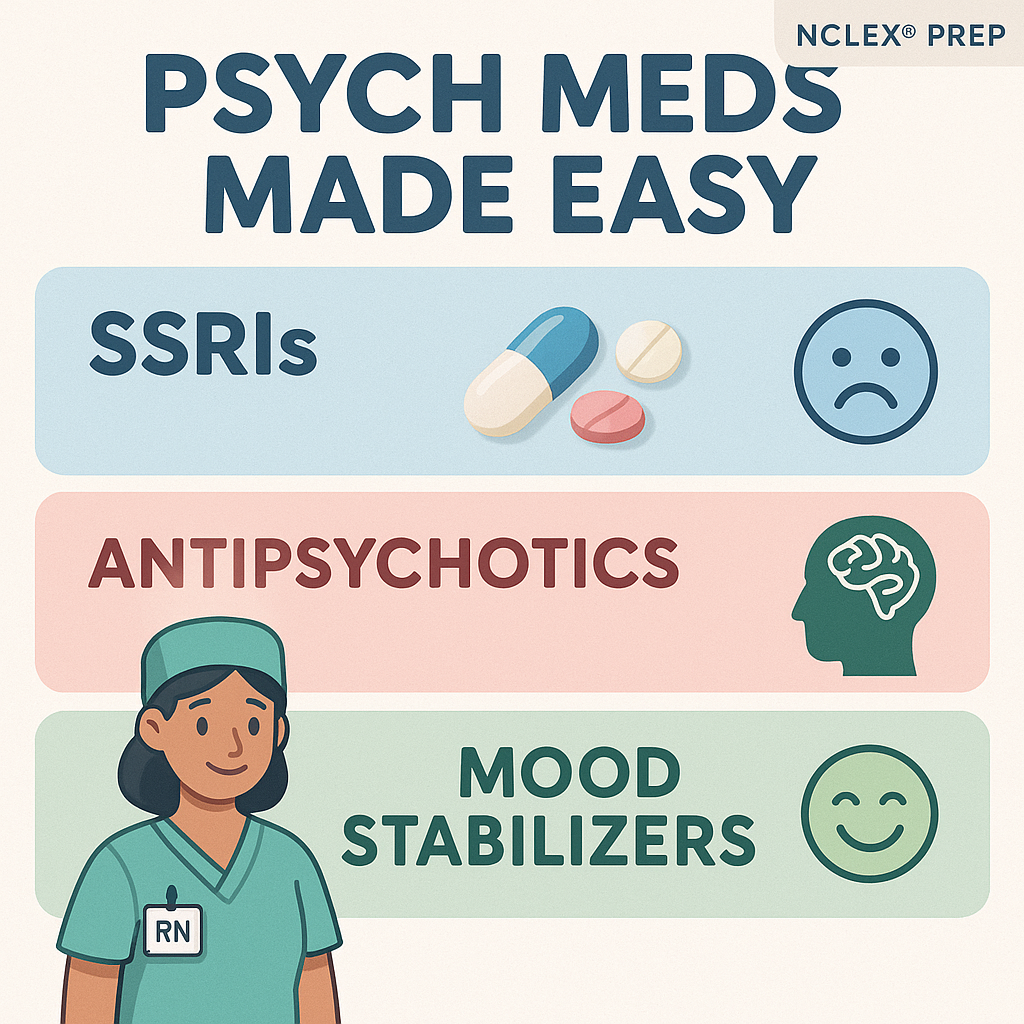Understanding psychiatric medications is essential for every RN nurse, whether you’re studying for the NCLEX or providing direct care. These medications affect the brain’s chemistry and are often used to treat depression, anxiety, bipolar disorder, and schizophrenia.
This guide breaks down SSRIs, antipsychotics, and mood stabilizers into easy-to-remember facts—perfect for your nursing bundle or a quick review before clinicals.
🧠 Why Nurses Must Understand Psych Meds
Registered nurses are often the first to notice changes in mood, behavior, or side effects related to psych medications. That’s why the NCLEX includes many questions about mental health meds, safety, and patient teaching.
Knowing the basics of psych meds helps nurses:
- Monitor for dangerous side effects
- Educate patients and families
- Provide safe, evidence-based care
- Prepare for real-life mental health scenarios
💊 SSRIs – Selective Serotonin Reuptake Inhibitors
Examples: Fluoxetine (Prozac), Sertraline (Zoloft), Citalopram (Celexa), Paroxetine (Paxil), Escitalopram (Lexapro)
✅ Used For: Depression, anxiety, PTSD, OCD
🧠 How They Work: Increase serotonin levels in the brain
⚠️ Side Effects: Sexual dysfunction, weight gain, insomnia, GI upset
🚨 Watch For: Serotonin Syndrome—confusion, agitation, tremors, fever
🩺 RN Nurse Tip: Takes 2–4 weeks to work. Don’t stop suddenly. Use caution with St. John’s Wort or other antidepressants.
🧠 Antipsychotics – Typical vs. Atypical
1. Typical Antipsychotics (First-Gen)
Examples: Haloperidol (Haldol), Chlorpromazine
✅ Used For: Schizophrenia, acute psychosis
⚠️ Major Risk: Extrapyramidal Symptoms (EPS) – tremors, rigidity, restlessness
🚨 NCLEX Alert: Watch for Neuroleptic Malignant Syndrome (NMS) – high fever, stiff muscles, confusion
2. Atypical Antipsychotics (Second-Gen)
Examples: Risperidone, Olanzapine, Quetiapine, Clozapine
✅ Used For: Schizophrenia, bipolar disorder
🧠 Better for: Negative symptoms (flat affect, social withdrawal)
⚠️ Side Effects: Weight gain, diabetes risk, sedation
🩺 RN Nurse Reminder: Clozapine requires weekly WBC checks due to agranulocytosis risk.
⚖️ Mood Stabilizers
1. Lithium
✅ Used For: Bipolar disorder (mania prevention)
⚠️ Narrow therapeutic range: 0.6–1.2 mEq/L
🚨 Toxicity signs: Nausea, vomiting, tremors, confusion, seizures
🩺 NCLEX Tip: Avoid dehydration and low sodium—both increase lithium toxicity risk.
2. Anticonvulsants as Mood Stabilizers
Examples: Valproic acid (Depakote), Carbamazepine, Lamotrigine
✅ Used For: Bipolar disorder, mood swings
⚠️ Side Effects: Liver toxicity, pancreatitis, rash (Lamotrigine = SJS risk!)
🩺 RN Nurse Task: Monitor liver enzymes, CBC, and mood changes regularly.
📚 Nursing Considerations for Psych Meds
As part of your nursing education bundle or clinical review, always remember:
- Start low, go slow: Psychiatric meds often begin at low doses and increase gradually.
- Monitor labs: Especially for lithium and anticonvulsants.
- Patient teaching: Emphasize adherence, managing side effects, and not stopping abruptly.
- Mental health awareness: Encourage open communication and involve family/support systems when appropriate.
🧪 Labs and Monitoring
| Medication | What to Monitor |
|---|---|
| Lithium | Lithium levels, sodium, kidney fx |
| Clozapine | WBC count |
| Valproic acid | Liver enzymes, platelets |
| Carbamazepine | CBC, liver function |
🧠 NCLEX Psych Med Quick Tips
- Don’t mix MAOIs with SSRIs—risk of serotonin syndrome.
- Black box warnings for suicidality—especially in teens.
- Always assess for suicidal ideation when starting or changing psych meds.
- Watch for EPS and NMS with antipsychotics.

